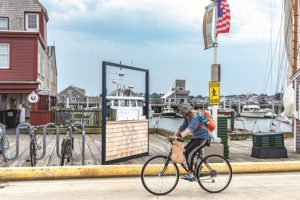PROVINCETOWN — Two seals drift in the water, poking their heads above the surface and looking at one another. “I think they’re in love,” says a child’s voice, excitedly. The video on the Expedition Blue Instagram account was captured by Bert Jackson, director of community engagement for the Cape Cod Blue Economy Foundation, and it shows the essence of the foundation’s mission, said Jackson: fostering interest in the aquatic world. “How do we help inspire that?” asks the foundation. “How do we inspire the next marine biologist?”
When art installations went up around Provincetown promoting the town’s blue economy, eyebrows were raised at some of the locations. And after some members expressed their disapproval of the visual design, the select board voted on June 16 to move one of the installations that they felt was blocking the public’s views, and asked the Provincetown Harbor Committee to suggest several new locations.
At the June 30 meeting of the harbor committee, member Laura Ludwig moved to recommend that the select board approve the new location recommended by Marine Coordinator Rex McKinsey — off the West End rotary by the Provincetown Inn.

Ludwig said the harbor committee had not been involved in choosing the original location for the piece. They were asked what industries they felt were important to highlight with the installations, but the committee is responsible only for issues of public access and Chapter 91 licensing.
At the same time, the harbor committee was focused on its own visually oriented effort: installing town landing signs with information about access. Early on, the committee had hoped that those signs would dovetail with Expedition Blue, but when it became clear that the Blue Economy installations weren’t just about landings, Ludwig said her committee focused on getting their own signs installed at the 13 landings in town.
The Blue Economy Project is a Chamber of Commerce initiative, and the foundation was launched to see it through. The installations — called “Expedition Blue: Waypoints” — are just one facet of the initiative.
“The Cape Cod region’s environment is its economy,” says the foundation’s website, and the blue economy would help balance economic and environmental health, create regional pride, and support a sustainable year-round economy for residents.
Expedition Blue: Waypoints dates back to early 2019, when it was first conceived, said Jackson. Two years later, with the support of a state grant, there are over 30 installations in 10 towns on the Cape and Islands, including Provincetown, Chatham, Brewster, Yarmouth, Barnstable, Falmouth, Sandwich, and Bourne.
The target audience is broad, but it’s “certainly more about people who are living here,” said Jackson, who lives in Brewster. It’s challenging for many young adults who grew up on the Cape to afford to continue to live here, and Expedition Blue seeks to stimulate interest in industries endemic to Cape Cod in a push to make them more sustainable. “It’s really about showcasing opportunity,” said Jackson.
That opportunity can come through shellfishing, marine sciences, or marine technology. Expedition Blue’s purpose is to “facilitate and connect the dots,” he said. For example, Cape Cod is the “center of the world for marine biotics” and for whale research, said Jackson, and part of the foundation’s mission is to make that more visible.
The installations themselves were designed by CambridgeSeven, a Boston architecture firm. CambridgeSeven drew inspiration from past architectural movements on the Cape — from the original lifesaving stations to the mid-century modern house movement on the Outer Cape.
Towns selected what they wanted from the available parts to form each installation, so that each town related itself to the blue economy, said Jackson, although the Provincetown Select Board members said they did not recall participating in that process. As for how the installations are being received: “Design is very subjective,” said Jackson.
John Santos, another member of the harbor committee and owner of Flyer’s Boat Rentals, doesn’t object to a blue economy per se, but feels there’s no point promoting it without addressing the lack of infrastructure in Provincetown. For that reason, Santos wants to table the initiative’s installations.
“If they were serious about a blue economy, there are things you need. Help is one,” Santos said, referring to the region’s inadequate labor force. Storage for things like shellfishing gear is another, he said.
Santos was born and raised in Provincetown and has been running Flyer’s, started by his father in 1944, for decades. He’s seen the town change, and to pay his rising taxes he built apartments above the business.
“Cape Codders wear many hats” to make ends meet, Santos said, and the blue economy can’t be developed without better infrastructure. “A sign is just a sign.”
